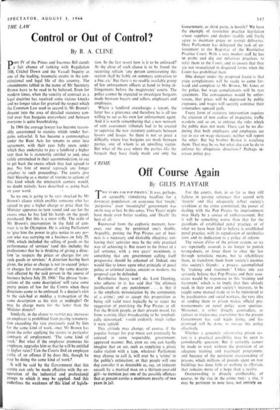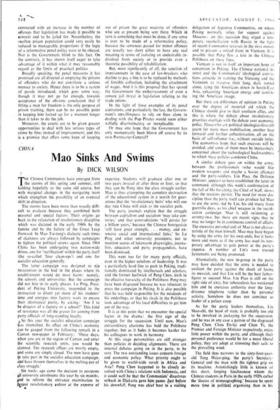Off Course Again
CRIME
By GILES PLAYFAIR
TWO YEARS FOR POP PIRATES.' It was, perhaps, an agreeably stimulating headline for a downcast population; an assurance that 'tough.' 'purposive.' even 'meaningful' government was on its way at last. In this sense, 'Five Years' might have made even better reading, and 'Death' the best of all.
Recovered from the euphoric moment, how- ever, one may be permitted one's doubts. Arguably, putting the Pop Pirates out of busi- ness is a necessary and desirable objective; out- lawing their activities may be the only practical way of achieving it. But resort to the threat of a jail sentence, with a two years' maximum, is something that any government calling itself progressive should be ashamed of. Indeed, one would like to know upon what principle of penal policy or criminal justice, ancient or modern, the proposal can be defended.
Retributive theory won't do. Lord Denning, who adheres to it, has said that 'the ultimate justification of any punishment . . . is that it is the emphatic denunciation by the community of a crime'; and to accept this proposition as being still valid must logically be to reject the suggestion of punishing the Pop Pirates at all. For the British people, in their present mood, far from wanting illicit broadcasting to be 'emphati- cally denounced,' would evidently much rather it were upheld.
This attitude may change, of course, if the popular hunger for pop music can eventually be satiated in some respectable, government- approved manner. But, even so, one can hardly imagine that an act, such as supplying a pirate radio station with a tape, whatever Parliament may choose to call it, will ever be a 'crime' in the public's estimation; or that people will one day consider it as detestable as, say,. an indecent assault by a married man on a thirteen-year-old girl—to mention just one of the possible offences that at present carries a maximum penalty of two years in jail. For the courts, then, in so far as they still believe in passing sentences that accord with `deserts' and ttiat adequately reflect society's revulsion at the crime committed, the power of dealing with the Pop Pirates by imprisonment may likely be a source of embarrassment. But it will be something worse than that for the guardians of established penal practice, or of what we have been led to believe is established penal practice, with its repudiation of retributive aims and its dedication to a policy of reform.
The raison d'etre of the prison system, so we are repeatedly assured, is no longer to punish wrong-doers, or force them to obey the law through terroristic means, but to rehabilitate them, to transform them from society's enemies into society's friends: a process accomplished by 'training and treatment.' Unless one can seriously believe that Pop Pirates and their asso- ciates would be responsive to this 'training and treatment,' which is to imply that they already need, in their own and society's interests, to be taught some manual trade or to be ministered to by psychiatrists and social workers, the very idea of sending them to prison makes official pro- nouncements on penal policy seem spurious. Moreover, it either directly contradicts, or reduces to irrelevance. everything that the present Government has said needs doing, and has promised will be done. to nursue this policy effectively.
Whether a genuinely reformative prison sys- tem is 'a practical possibility may be open to considerable question. But it certainly cannot be made to work without the provision of an adequate training and treatment programme: and because of the persistent overcrowding of prisons, which millions of pounds spent on new buildings has done little or nothing to alleviate, that remains more of a hope than a reality.
Overcrowding is directly attributable, of course, to the rise in the crime rate: a rise, it may be pertinent to note here, not entirely un connected with an increase in the number of offences that legislation has made it possible to commit and to be jailed for. Nevertheless, the swollen prison population could very easily be reduced to manageable proportions if the logic of a reformative penal policy were to be obeyed. Nor is the Government blind to this fact. On the contrary, it has shown itself eager to take advantage of it within what it may reasonably regard as the limits of practical politics. Broadly speaking, the penal measures it has promised are all directed at emptying the prisons of offenders who do not constitute a serious menace to society. Hence there is to be a system of parole introduced, which goes some way, though it may not go far enough, towards acceptance of the obvious conclusion that if fitting a man for freedom is the only purpose of prison training, there can be no possible point in keeping him locked up for a moment longer than it takes to do the job. Moreover, the courts are to be given greater opportunities to deal with less serious types of crime by fines instead of imprisonment; and this is a promise that offers some hope of keeping out of prison the great majority of offenders who are at present being sent there. Which in turn is something that must be done, if any sense is ever to be made of a reformative policy, because the sentences passed for minor offences are usually too short either to have any real meaning in terms of isolating an undesirable in- dividual from society or to provide even a theoretic possibility of rehabilitation. But, most significantly of all, the sanction of imprisonment in the case of law-breakers who decline to pay a fine is to be replaced by methods of forcible collection, including the attachment of wages. And it is this proposal that has spared the Government the embarrassment of even a remote jail threat in legislation relating to the trade unions. In the light of these examples of its penal aspirations, and particularly the last, the Govern- ment's unwillingness to rely on fines alone in dealing with the Pop Pirates would seem either wilfully discriminatory or inexplicable.
Or may one hope that the Government has only momentarily been blown off course by its own Postmaster-General?






























 Previous page
Previous page